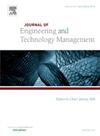Igniting twin transition through artificial intelligence and stakeholder value: The case of platform-based agri-food companies
IF 3.9
3区 管理学
Q2 BUSINESS
Journal of Engineering and Technology Management
Pub Date : 2025-10-01
DOI:10.1016/j.jengtecman.2025.101920
引用次数: 0
Abstract
This study presents an original and relevant exploration of how platform-based companies can leverage Artificial Intelligence to address sustainability challenges, particularly in compliance with European Sustainable Development Goals. Starting by the observation of platformization as a process bringing to Business Model Innovation and focusing on the intersection of Artificial Intelligence and sustainability, the study fills a critical gap in existing literature, which often overlooks the specific implications of Artificial Intelligence integration in various business scenarios. A comprehensive conceptual framework that guides the study’s investigation into Artificial Intelligence as a boost for the twin transition with a focus on advancing stakeholder legitimacy within agri-food platform-based companies was designed. The study was based on a qualitative research approach through a three-phases methodology. The results of study derived from a Systematic Literature Review within content analysis and multiple case study that using desktop analysis on a 52 platform-based agri-food companies sample. Follow a discussion through inside-out and outside-in perspective underline results evidence in order to build academic evidence for practice and empirical evidence for academia. The use of Artificial Intelligence in sustainable practices provides concrete evidence that enhances the understanding of how value is created, captured, and delivered within platform-based business models for sustainability. Moreover, the impact of these AI-driven practices on stakeholder perceptions offers updated empirical insights into Stakeholder Theory, particularly regarding the practical mechanisms through which normative legitimacy is built or undermined in the context of advanced technologies. The research agenda outlines critical avenues for future investigation. These directions aim to deepen our understanding of the complex interplay between advanced technologies, sustainable transformation, and societal acceptance.
通过人工智能和利益相关者价值点燃双重转型:以平台型农业食品公司为例
本研究对基于平台的公司如何利用人工智能来应对可持续发展挑战,特别是在符合欧洲可持续发展目标的情况下,进行了新颖而相关的探索。该研究从观察平台化作为商业模式创新的一个过程开始,关注人工智能与可持续性的交叉,填补了现有文献的一个关键空白,这些文献往往忽视了人工智能集成在各种商业场景中的具体含义。设计了一个全面的概念框架,指导该研究对人工智能的调查,以促进双重转型,重点是提高基于农业食品平台的公司的利益相关者合法性。本研究采用质性研究方法,分为三个阶段。研究结果来源于系统文献综述中的内容分析和多案例研究,使用桌面分析对52家基于平台的农业食品公司样本进行分析。通过由内到外和由外到内的角度进行讨论,强调结果证据,以便为实践建立学术证据,为学术界建立经验证据。在可持续实践中使用人工智能提供了具体的证据,增强了对如何在基于平台的可持续商业模式中创造、获取和交付价值的理解。此外,这些人工智能驱动的实践对利益相关者观念的影响为利益相关者理论提供了最新的经验见解,特别是关于在先进技术背景下建立或破坏规范合法性的实践机制。研究议程概述了未来调查的关键途径。这些方向旨在加深我们对先进技术、可持续转型和社会接受之间复杂相互作用的理解。
本文章由计算机程序翻译,如有差异,请以英文原文为准。
求助全文
约1分钟内获得全文
求助全文
来源期刊
CiteScore
8.00
自引率
6.20%
发文量
29
审稿时长
>12 weeks
期刊介绍:
The Journal of Engineering and Technology Management (JET-M) is an international scholarly refereed research journal which aims to promote the theory and practice of technology, innovation, and engineering management.
The journal links engineering, science, and management disciplines. It addresses the issues involved in the planning, development, and implementation of technological capabilities to shape and accomplish the strategic and operational objectives of an organization. It covers not only R&D management, but also the entire spectrum of managerial concerns in technology-based organizations. This includes issues relating to new product development, human resource management, innovation process management, project management, technological fusion, marketing, technological forecasting and strategic planning.
The journal provides an interface between technology and other corporate functions, such as R&D, marketing, manufacturing and administration. Its ultimate goal is to make a profound contribution to theory development, research and practice by serving as a leading forum for the publication of scholarly research on all aspects of technology, innovation, and engineering management.

 求助内容:
求助内容: 应助结果提醒方式:
应助结果提醒方式:


